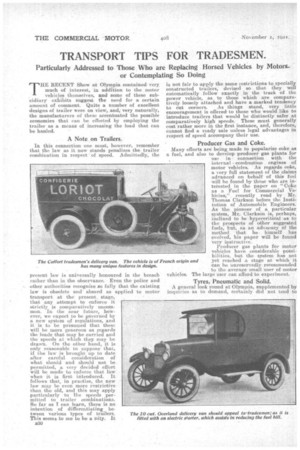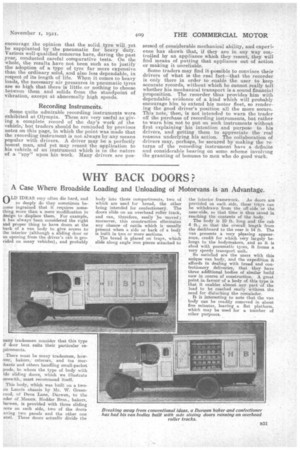TRANSPORT TIPS FOR TRADESMEN.
Page 20

Page 21

If you've noticed an error in this article please click here to report it so we can fix it.
Particularly Addressed to Those Who are Replacing Horsed Vehicles by Motors, or Contemplating So Doing
TilE RECENT Show at Olympia contained very much of interest, in addition to the motor vehicles themselves, and some of these subsidiary exhibits suggest the need for a certain amount of comment.. Quite a number of excellent designs of trailer were on view, and, very naturally, the manufacturers of these accentuated the possible economies that can be effected by employing the trailer as a means of increasing the load that can be hauled.
A Note on Trailers.
In this connection one must, however, remember that the law as it now stands penalizes the trailer combination in respect of speed. Admittedly, the present law is universally honoured in the breach rather than in the observance. Even the police and other authorities recognize so fully that the existing law is obsolete and absurd as applied to motor transport at the present stage, that any attempt to enforce it strictly is comparatively uncommon. In the near future, ho'wever, we expect to be governed by a new system of regulations, and it is to be presumed that these will be more generous as regards the loads that may be carried and the speeds at which they may be drawn. On the other hand, it is only reasonable to suppose that, if the law is brought up to date after careful consideration of what should and should not be permitted, a very decided effort will be made to enforce, that law when it is first introduced. It follows that, in practice, the new law may be even more restrictive than the old, and this may apply particularly to the speeds permitted to trailer combinations. So far as I can learn, there is no intention of differentiating between various types of trailers. This seems to me to be a nity. It /130 is not fair to apply the same restrictions to specially constructed trailers, devised so that they will automatically follow exactly in the track of the power vehicle, as to those which are comparatively loosely attached and have a marked tendency to cut corners. As things stand, very little encouragement is offered to those who would like to introduce trailers that would be distinctly safer at comparatively high speeds. These must generally cost rather more in the first instance, and, therefore, cannot find a ready sale unless legal advantages in respect of speed accompany their use.
Producer Gas and Coke.
Many efforts are being made to popularize coke as a fuel, and also to develop producer gas plants for use in connection with the internal combustion engines of motor vehicles. As regards coke, a very full statement of the claims advanced on behalf of this fuel will be found by those who are interested in the paper on "Coke as a Fuel for Commercial Vehicles," recently read by Mr. Thomas Clarkson before the Institution of Automobile Engineers. As the pioneer of a particular system, Mr. Clarkson is, perhaps, inclined to be hypercritical as to the prospects of other suggested fuels but, as an advocacy of the method that he, himself has evolved, his paper will be found very instructive.
Producer gas plants for motor vehicles have considerable possibilities, but the system has not yet reached a stage at which it can be unreservedly recommended to the average small user of motor vehicles. The large user can afford to experiment.
Tyres, Pneumatic and Solid.
A general look round at Olympia, supplemented by inquiries as to demand, certainly did not tend to encourage the opinion that the solid tyre will yet be supplanted by the pneumatic for heavy duty. Various well-qualified concerns have, during the past year, conducted careful comparative tests. On the whole, the results have not been such as to justify the adoption of a type of tyre far more expensive than the ordinary solid, and also less dependable, in respect of its length of life. When it comes to heavy loads, the necessary air pressures in pneumatic tyres are so high that there is little or nothing to choose between them and solids from the standpoint of vibration, except at abnormally high speeds.
Recording Instruments.
Some quite admirable recording instruments were exhibited at Olympia. These are very useful as giving a complete record of the day's work of the vehicle, but traders should be reminded by previous notes on this page, in which the point was made that the recording instrument is not always by any nieans popular with drivers. A driver may be a perfectly honest man, and yet may resent the application to his vehicle of an instrument which is in the nature of a "spy" upon his work. Many drivers are pos
sessed of considerable mechanical ability, and experience has shown that, if they are in any way controlled by an appliance which they resent, they will find means of putting that appliance out of action or making it unreliable.
Some traders may find it possible to convince their drivers of what is the real fact—that the recorder is only there in order to enable the user to keep accurate records, without which he cannot really tell whether his mechanical transport is a sound financial preposition. The recorder thus provides him with dependable evidence of a kind which will probably encourage him to extend his motor fleet, so rendering the good driver's position all the more secure. This note,' then, is not intended to warn the trader off the purchase of recording instruments, but rather to warn him not to put on such instruments without first explaining his intention and purpose to his drivers, and getting them to appreciate the real reasons underlying his action. The collaboration of drivers may, perhaps, be secured by making the returns of the recording instrument have a definite and considerable bearing on some scheme involving the granting of bonuses to men who do good wark.
































